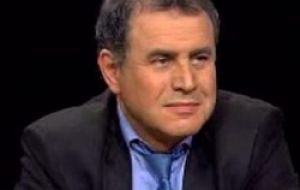MercoPress. South Atlantic News Agency
Roubini warns Brazil about asset-bubble; recommends limiting Real appreciation
 The New York University professor who predicted the global financial crisis was in Sao Paulo for a conference
The New York University professor who predicted the global financial crisis was in Sao Paulo for a conference Nouriel Roubini, the New York University professor who predicted the global financial crisis before markets peaked, said the Brazilian, Chinese and Indian economies may be overheating and developing asset bubbles.
The outlook for Brazil’s economy is “very positive,” though the debt crisis in the Euro zone countries and a slow “U-shaped” recovery globally could dent the country’s growth, Roubini said at an event in Sao Paulo.
“In Brazil, like in many other emerging market economies, there is now evidence of overheating of the economy,” Roubini said. “Expected and actual inflation is starting to rise, and that implies that over the next few quarters there has to be a tightening of monetary policy, gradually but progressively, in order to make sure that inflation expectations remain anchored.”
Roubini, 52, recommended that Brazilian policy makers take steps to limit the appreciation of the Real, including the “judicious” use of capital controls. The currency has gained 8.2% against the dollar over the past 12 months.
The stronger Real has made the country’s exports more expensive in dollar terms, and the economy could also be hit by a fall in commodity prices, which are likely to decline over the next 6 months to 12 months because of a possible double-dip recession in Europe and a US slowdown, Roubini said.
The Euro zone economies are likely to stagnate this year, and Greece is growing closer to insolvency and may be forced to restructure its debt, Roubini added.
Europe’s currency has dropped 14% against the US dollar this year.
Chinese economic growth may slow to an annual rate of 7% to 8% by the end of the year or early 2011, Roubini said Monday in Sao Paulo. US economic growth may slow to less than 2% in the second half of the year, Roubini said.
China’s challenge is to boost domestic demand to sustain an economic expansion that has been based so far on investments and exports, he said.
Brazil and India are in a “better shape” than China regarding the strength of domestic demand, Roubini said. Emerging markets can grow between 5% and 8% during the global economic recovery compared to between 2% and 3% for rich nations, he said. He didn’t provide further details about his growth outlook for India or China.
China’s economic growth accelerated to the fastest pace in almost three years in the first quarter, rising 11.9% from a year earlier. India’s GDP rose 8.6% in the three months ending March 31 from a year earlier, following a revised 6.5% gain in the previous quarter, the statistics office in New Dehli said Monday.
Brazil’s GDP may have expanded 8.5% on an annual basis in the first quarter and could grow 7% or more in 2010, according to official estimates, which would be the highest in almost two decades.
Professor Roubini, who is also chairman and co-founder of Roubini Global Economics LLC in New York, failed to predict the market rebound that sent shares across the globe soaring last year. The S&P 500 Index surged 80% from a March 2009 low to a peak in April this year.




Top Comments
Disclaimer & comment rulesCommenting for this story is now closed.
If you have a Facebook account, become a fan and comment on our Facebook Page!